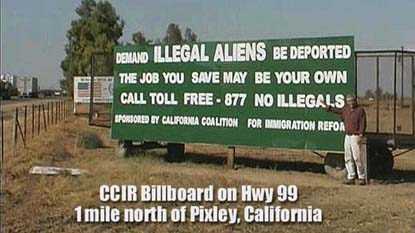Reading Response to
500 Anos de Pueblo Chicano
The Picture
that Isn't There
This is about what
isn't seen.
This is about the invisible people
who are hidden in the hills,
behind the dumpsters
and inside the darkened windows of INS busses.
This is about the people who have left behind
their homes,
their families
and their possessions.
This is about a memory.
This is about privilege and choice
and who gets to have them.
This is about fear.
This is about intolerance.
|
Links |
 |
The year of 1991 was spent primarily traveling back and forth
to highway 74 in the coastal mountains of southern California.
Having grown up in the San Joaquin valley amid established agriculture
and industry, the cultural differences amazed me. The people seemed
rude and uncivilized, the amount of drinking and drugs was apparent
in day to day life and here those very people were the ones who
were considered successful. The mountain people where we camped
fit the description of 'nuts and flakes' given to Californians.
Therefore, it wasn't unthinkable that I sleep with protection
in the form of a gun or an armed husband.
Our arrangements were primitive. We had a converted school bus,
a porta potty outside, an ice chest, a stove and comfortable beds.
We had curtains at the windows for privacy. We had a generator
for an hour or two of light at night. We rigged a black barrel
on a hillside to warm water for a shower and before we had that,
we swam in the water truck for a bath. We had jobs. I was a flagger
on the highway; my husband owned the water truck.
We were there by choice.
We also had a home in the San Joaquin Valley and a car and a pickup
(both old but running) and we could go home every couple of weeks.
Our children stayed at home until school was out and then camped
out with us.
In the middle of the summer's heat, my husband related to me what
happened over the weekend that I had gone home. Men would appear
in our campsight, two or three at a time. They spoke no English.
They looked tired and hungry. The one word they all spoke was
"Agua". My husband pointed them down the dirt road.
They would leave and soon some more would show up.
He said he felt bad but was afraid. He knew they must be thirsty,
because the canyon was dry. He knew they were illegals and had
no place to go. But still he was afraid to share our limited potable
water with them for fear that more would come. The water in the
truck was reclaimed and not for drinking.
I asked the next week when I stopped an INS car on the highway,
"what happened over the weekend?"
The INS man said that a bus of deportees had found the rear door
unlocked in their bus as it sat in a parking lot. They all escaped.
They had come 12 miles by the time they found our campsight.
I will never see a picture of these men.
I will never know if they made it to where they were going.
Later in the summer, we moved onto a ranch and stayed in a
one-room apartment. Our sixteen-year-old daughter and baby granddaughter
stayed in the bus. We had a Citizens Band radio for communication
between the ranch and the bus. Early one morning we heard a whispered
cry for help over the radio. My husband was immediately up and
on his feet. The caretaker of the ranch heard it also and a 3-way
conversation took place. Several men were just outside the bus
and our daughter was frightened. My husband and the caretaker
loaded their guns and left rapidly up the canyon to the campsite.
As she had reported, there were several immigrants near the bus,
sitting beside it and resting. When the two armed men appeared
they scattered all running for the highway. All except for a boy
and a girl about the same age as our daughter and in her arms
a baby. They stared in fear and started on the dirt road towards
the highway. My husband ran toward them the gun still in his hand.
The young couple looked at him in terror and bolted. At the same
time the sound of a car doors slamming and tires squealing told
us the truth that these immigrants had been waiting for a their
ride. The young couple disappeared into the brush. It would be
a long hot walk for them before they could find safety.
When my husband and daughter and granddaughter appeared, they
all looked haggard. The look on my husband's face was crestfallen.
" I only wanted to give them some help." He said. "Some
breakfast or some money. They were the same age as Chris. They
were young and trying to start a new life."
The face of the young couple is the picture I
will never see.
They are invisible.
But they are here.
Table of Contents
Last updated on January 20. 2000
By KimMarie Pozar Gaye
